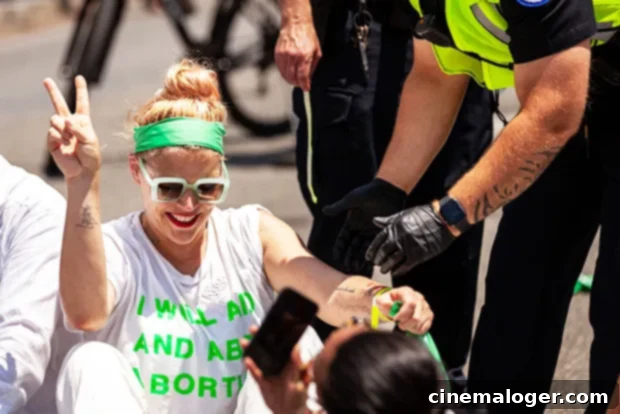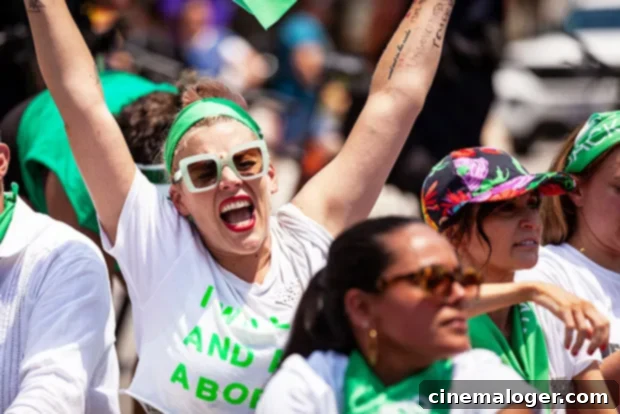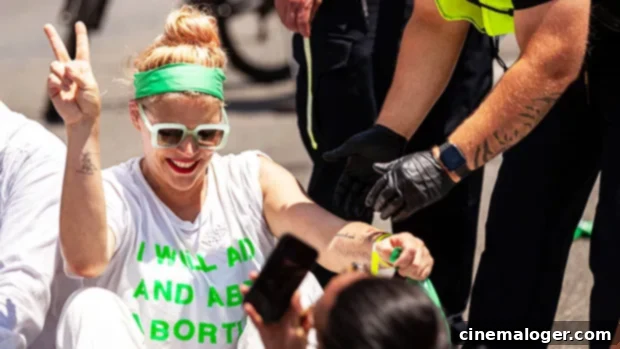Busy Philipps Arrested: A Powerful Stand for Reproductive Freedom and Equality in a Post-Roe Era
In a moment that underscored the profound seismic shift in American jurisprudence and civil liberties, actress and activist Busy Philipps found herself on the front lines of a heated battle, literally taking to the streets and facing arrest. Her impassioned protest, sparked by the conservative Supreme Court justices’ contentious decision to overturn the long-standing constitutional right to abortion previously established by *Roe v. Wade*, quickly garnered national attention. Philipps’ actions, driven by a deep personal conviction and a fervent belief in fundamental equality, brought into sharp focus the raw emotions and fierce determination characterizing the fight for reproductive rights across the United States. This act of civil disobedience was not merely a celebrity headline; it was a potent symbol of widespread dissent against a ruling that stripped away nearly fifty years of precedent, profoundly impacting the lives and autonomy of millions of Americans.
“I’m doing this for you guys. I’m doing this for my kids,” Busy Philipps declared in one of the compelling Instagram Stories she recorded during her powerful protest at the Supreme Court on Thursday, June 30. At 43 years old, Philipps stood resolute amidst a throng of protestors, wearing a t-shirt emblazoned with the unequivocal message: “I WILL AID AND ABET ABORTION.” This clear statement encapsulated the defiant spirit of those who gathered to voice their outrage and opposition to the overturning of *Roe v. Wade*. Her motivation ran deeper than just political conviction; it was profoundly personal. “I’m doing this for my kids, I’m doing this for my mom, I’m doing this for my grandma,” the actress reiterated in her Instagram Story, posted moments before law enforcement officers intervened. She, along with numerous other protestors, was arrested for blocking traffic directly outside the United States Supreme Court building, an act of peaceful civil disobedience designed to draw maximum attention to their cause.
As Busy Philipps was escorted away by authorities, *Vice News* reporters were on the scene, capturing the unfolding events. When asked about her reasons for protesting, Philipps concisely stated that she was demonstrating for “equality.” Her commitment to the cause did not wane after her arrest. Shortly after being processed and released, she posted another Instagram Story, showing her running, accompanied by the update: “Processed. Released. Running to catch a train.” She further informed her followers that the full account of her experience and ongoing reflections would be made available on her new Substack platform, aptly titled *A Bear On a Wire*, indicating her continued dedication to sharing her perspective and galvanizing support for reproductive rights. This immediate follow-up underscored her intent to transform a personal experience of activism into a broader platform for advocacy and discussion.


Following her release, Busy Philipps shared a powerful video of her arrest on her Instagram account, accompanying it with a lengthy and deeply personal post. In this extensive statement, she articulated the gravity of the Supreme Court’s decision, explaining her reasons for participating in the protest. “On Friday, the right to make decisions about our own bodies and lives – a right we’ve had for almost 50 years – was ripped away from us by this new Supreme Court, a Court whose personal belief’s are NOT shared by the vast majority of Americans. I am one of those Americans.” Her words resonated with millions who felt the same sense of injustice and disempowerment, highlighting the widespread discontent with a ruling that diverged sharply from public opinion. This sentiment was crucial, as it framed the overturning of *Roe v. Wade* not just as a legal decision, but as a profound affront to personal autonomy and democratic principles, impacting individuals across diverse demographics who believe in the fundamental right to choose.
In her Instagram post, Philipps emphasized the collective effort behind the protest, stating, “I was proud to stand today alongside Planned Parenthood Action Fund, the Working Family’s Party, Reverend Barber and the Poor People’s Campaign, Catholics for Choice, The National Council of Jewish Women, mi Familia Vota, the Center For Popular Democracy Action and NARAL in an action of peaceful civil disobedience.” This list of diverse organizations showcased the broad coalition united against the Supreme Court’s decision, demonstrating that the fight for reproductive rights transcends political affiliations and religious backgrounds. Philipps clarified that the purpose of their action was not just to inform “lawmakers but more importantly, the people who will be most impacted by this outrageous decision, know that we will not back down, we will not give in and we will not stop fighting until there is equality for all Americans.” This declaration serves as a rallying cry, cementing her commitment and that of countless others to a sustained and relentless advocacy for fundamental rights and a more equitable society.
.@BusyPhilipps was arrested at a protest in front of the Supreme Court today, and tells VICE News that she’s getting arrested for “equality.” pic.twitter.com/MOm6ZyY6Cl
— VICE News (@VICENews) June 30, 2022
Busy Philipps’ current activism is deeply rooted in her personal history and her long-standing commitment to reproductive rights advocacy. In 2019, she bravely revealed that she had an abortion when she was just 15 years old. This candid confession came at a crucial time, prompted by Georgia’s passage of a stringent ban on abortions after six weeks of pregnancy – a period often before a woman even realizes she is pregnant. During an episode of her talk show, *Busy Tonight*, Philipps underscored the urgency of sharing such personal narratives. “I’m telling you this because I am genuinely really scared for women and girls all over this country,” she stated, as reported by Yahoo. Her intention was clear: to encourage open dialogue and dismantle the stigma surrounding abortion. She believed that by sharing individual stories, society could foster greater empathy and understanding, highlighting the myriad circumstances that lead individuals to make these deeply personal decisions.
Expanding on her conviction, Philipps passionately articulated a core belief central to the reproductive rights movement: the paramount importance of individual agency in healthcare decisions. “I know that people feel very strongly about abortion, but let me just say this: Women and their doctors are in the best position to make informed decisions about what is best for them,” she asserted with unwavering resolve. Her statement serves as a powerful testament to the principle of bodily autonomy, emphasizing that deeply personal medical choices should remain between a patient and their trusted healthcare provider, free from political interference or external judgment. She concluded with a definitive and emphatic declaration, leaving no room for ambiguity: “Nobody else, nobody.” This succinct yet profound statement encapsulates the essence of the fight for reproductive freedom, advocating for the right of individuals to control their own bodies and futures without governmental or societal intrusion.
The overturning of *Roe v. Wade* by the Supreme Court in June 2022 sent shockwaves across the nation, effectively eliminating the constitutional right to abortion and leaving it to individual states to regulate or ban the procedure. This landmark decision immediately triggered a cascade of legislative actions, with many states implementing “trigger laws” that swiftly banned or severely restricted abortion access. The consequences of this ruling are far-reaching, disproportionately affecting marginalized communities, women of color, and individuals in lower socioeconomic brackets who often face significant barriers to healthcare access. The ruling ignited a firestorm of protests and widespread outrage, mobilizing activists like Busy Philipps to take immediate and visible action, asserting that reproductive healthcare is a fundamental human right.
Busy Philipps’ arrest, therefore, transcended a mere individual incident; it became a symbol of the broader resistance movement. Her willingness to engage in civil disobedience, a time-honored tradition in American activism, showcased the depth of conviction felt by many. Civil disobedience, by its very nature, involves intentionally breaking a law to protest an unjust policy or demonstrate strong moral opposition. For Philipps and her fellow protestors, blocking traffic at the Supreme Court was a deliberate act designed to force attention onto the perceived injustice of the court’s ruling, using their bodies to make a statement when their voices felt unheard by the highest judicial body.
Celebrity involvement in social and political issues often plays a dual role: it amplifies messages to a wider audience and humanizes complex issues. Philipps, with her significant public platform, leveraged her influence to draw attention to the abortion rights movement, transforming a private conviction into a public demonstration of solidarity. Her Instagram updates, from the protest itself to her post-arrest reflections and commitment to her new Substack, illustrate how social media has become an indispensable tool for activists. It allows for real-time dissemination of information, direct engagement with supporters, and an unfiltered narrative that can bypass traditional media gatekeepers, thereby fostering a sense of community and shared purpose among those fighting for reproductive freedom.
The concept of “equality” that Philipps invoked during her arrest is central to the reproductive rights debate. Proponents argue that denying access to abortion is inherently discriminatory, particularly against women, as it infringes upon their bodily autonomy and ability to control their own lives, careers, and family planning. This perspective views reproductive freedom as inextricably linked to gender equality, asserting that true equality cannot exist if individuals are deprived of the fundamental right to make decisions about their own bodies. The fight for abortion access is thus framed as a fight for basic human rights, ensuring that all individuals have the agency to pursue their lives with dignity and self-determination.
Busy Philipps’ courageous act of protest and her ongoing advocacy through platforms like her Substack, *A Bear On a Wire*, serve as a potent reminder of the enduring struggle for reproductive justice. Her voice, alongside countless others, continues to demand accountability and advocate for policies that uphold bodily autonomy. The post-*Roe v. Wade* landscape is one of ongoing legal battles, grassroots organizing, and fervent political debate, but the unwavering commitment of individuals like Philipps ensures that the fight for reproductive freedom and equality remains at the forefront of the national conversation, inspiring continued action and hope for future generations seeking to reclaim fundamental rights.
